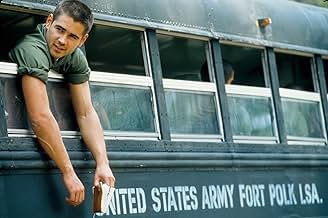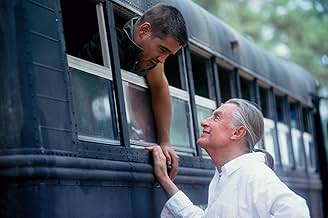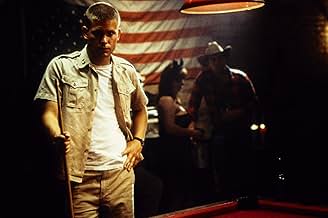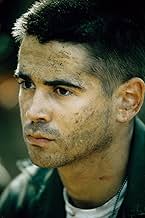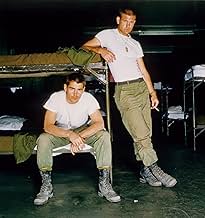CALIFICACIÓN DE IMDb
6.9/10
45 k
TU CALIFICACIÓN
Un grupo de reclutas se somete al entrenamiento avanzado de infantería de Fort Polk, el infame Tigerland de Luisiana, última parada antes de Vietnam para decenas de miles de jóvenes en 1971.Un grupo de reclutas se somete al entrenamiento avanzado de infantería de Fort Polk, el infame Tigerland de Luisiana, última parada antes de Vietnam para decenas de miles de jóvenes en 1971.Un grupo de reclutas se somete al entrenamiento avanzado de infantería de Fort Polk, el infame Tigerland de Luisiana, última parada antes de Vietnam para decenas de miles de jóvenes en 1971.
- Dirección
- Guionistas
- Elenco
- Premios
- 2 premios ganados y 5 nominaciones en total
Tom Guiry
- Pvt. Cantwell
- (as Thomas Guiry)
James MacDonald
- Staff Sgt. Thomas
- (as James McDonald)
- Dirección
- Guionistas
- Todo el elenco y el equipo
- Producción, taquilla y más en IMDbPro
Opiniones destacadas
American military authority is the enemy for Pvt. Roland Bozz (Colin Farrell), a nonconformist trainee who, along with other infantry trainees, endures brutal, sadistic treatment in preparation for combat in Vietnam. Tigerland is a swampy, steamy camp near Fort Polk, Louisiana that is supposed to simulate conditions in Vietnam. The story is set in 1971.
The amount and severity of physical and verbal aggression displayed in this film may be a tad overstated. But the point the film is making is that many, if not most, of the young guys drafted into the army in the late 60s and early 70s absolutely did not want, or deserve, to be there.
Roland Bozz is one of those young men. He's angry at the war, angry at the army. The army won't release him because they know that's what he wants. If Bozz can't get himself out, the next best thing is to try and get other recruits out. That will be his revenge, his way to fight the system.
A fellow trainee shares his background with Bozz, who then tells the trainee: "I know army regulations the way prisoners know the law. You're a hardship discharge, man, if ever I saw one. Okay. I'll get you out of the army". Bravo for Roland Bozz, a young rebel with a mission, a cause, trapped like the others by an oppressive, controlling institution.
Acting is very, very good. Colin Farrell is terrific, at a time when he, and the rest of the cast, was largely unknown. No need for overpaid A-list actors. The film's acting style trends naturalistic, spontaneous, and emotionally intense. None of the acting seems forced.
With a hand-held camera, combined with grainy film stock, and using quick zooms and unexpected cuts, the cinematography and editing convey a documentary look and feel, which results in sequences that are quite realistic. Lighting is mostly natural. Sets are plain and unadorned. Background music is minimal.
Much better than I ever expected, "Tigerland" is a well-made film with an intense, anti-war theme. It's about putting others ahead of one's own selfish interest. That Hollywood largely shunned this low-budget film is all the more reason to see it.
The amount and severity of physical and verbal aggression displayed in this film may be a tad overstated. But the point the film is making is that many, if not most, of the young guys drafted into the army in the late 60s and early 70s absolutely did not want, or deserve, to be there.
Roland Bozz is one of those young men. He's angry at the war, angry at the army. The army won't release him because they know that's what he wants. If Bozz can't get himself out, the next best thing is to try and get other recruits out. That will be his revenge, his way to fight the system.
A fellow trainee shares his background with Bozz, who then tells the trainee: "I know army regulations the way prisoners know the law. You're a hardship discharge, man, if ever I saw one. Okay. I'll get you out of the army". Bravo for Roland Bozz, a young rebel with a mission, a cause, trapped like the others by an oppressive, controlling institution.
Acting is very, very good. Colin Farrell is terrific, at a time when he, and the rest of the cast, was largely unknown. No need for overpaid A-list actors. The film's acting style trends naturalistic, spontaneous, and emotionally intense. None of the acting seems forced.
With a hand-held camera, combined with grainy film stock, and using quick zooms and unexpected cuts, the cinematography and editing convey a documentary look and feel, which results in sequences that are quite realistic. Lighting is mostly natural. Sets are plain and unadorned. Background music is minimal.
Much better than I ever expected, "Tigerland" is a well-made film with an intense, anti-war theme. It's about putting others ahead of one's own selfish interest. That Hollywood largely shunned this low-budget film is all the more reason to see it.
TIGERLAND (2000) ***1/2 Colin Farrell, Matthew Davis, Clifton Collins, Jr., Thomas Guiry, Shea Whigham, Russell Richardson, Nick Searcy, Afemo Omilani, James McDonald, Keith Ewell, Arian Ash, Haven Gaston, Cole Hauser. Filmmaker Joel Schumacher makes an audacious attempt to rekindle his directing juices in this low-budget semi-independent film about Vietnam with a cast of unknowns that works remarkably well. Set circa 1971 Louisiana in a special Army training camp for new recruits prior to shipment in the ongoing war and told in flashback by one of the survivors the film centers its bare bones plot around the able shoulders of Irish newcomer Farrell in a potential star-making turn as Private Roland Bozz (think 'One Flew Over the Cuckoo's Nest' in fatigues and you get the overall impression), a feckless troublemaker of his platoon whose antics have a method to his madness: keeping yourself alive despite the odds. Raw and uncompromising are best suited to describe the film's gist and in particular its focus of Bozz leading his comrades in arms through their hellish grunt duty prior to their fated dooms. Original and smartly written by Ross Klaven and Michael McGruther giving their characters a fresh spin on an all too familiar genre with humanity at its core.
War drama that takes place in Louisiana in 1971. It follows a bunch of recruits through basic training and then Tigerland--an accurate portrayal of Vietnam on American soil, before they're shipped over. It focuses on two men--Booz (Colin Farrell) and Paxton (Matthew Davis)...how they meet, become friends and deal with a corwardly squadron leader (Clifton Collins Jr.) and a borderline psycho (Shea Wingham).
A surprisingly non-commercial film directed by Joel Schumacher. He uses a hand-held camera throughout most of the movie and uses digital video for the combat scenes. It works very well--the film looks gritty (as it should) and uncomfortably realistic.
Farrell successfully covers up his Irish brogue and adopts a pretty convincing Southern accent. His performance is just superb--he's an extremely talented young man. Davis, unfortunately, is not that good. He's tall, muscular, very handsome--and very bland. The rest of the cast however is just great.
This film was thrown away by its studio. It had no stars in it, a familar story and was considered "just another war film". It only played a week in Boston! It's well worth catching on video or DVD.
Also, Farrell and Davis have a lengthy nude scene.
A surprisingly non-commercial film directed by Joel Schumacher. He uses a hand-held camera throughout most of the movie and uses digital video for the combat scenes. It works very well--the film looks gritty (as it should) and uncomfortably realistic.
Farrell successfully covers up his Irish brogue and adopts a pretty convincing Southern accent. His performance is just superb--he's an extremely talented young man. Davis, unfortunately, is not that good. He's tall, muscular, very handsome--and very bland. The rest of the cast however is just great.
This film was thrown away by its studio. It had no stars in it, a familar story and was considered "just another war film". It only played a week in Boston! It's well worth catching on video or DVD.
Also, Farrell and Davis have a lengthy nude scene.
It is certainly interesting to write a review about a film that took place where I actually resided for two months. In September of 1971 when this film is set, your's truly was doing his basic training at Fort Polk, Louisiana. I did get to the North Fort at one point in my training where the infamous Tigerland was located. In fact Tigerland was a nickname given to the whole northern part of the army base.
I was doing the basic training to be a weekend warrior and avoid Vietnam. But I saw so many of the kids who were just like the ones portrayed in the film it was actually a rather nerve wrecking old home week. In 1971 everyone except the policy makers in Washington knew that this was going to end when as Senator George Aiken declared, we said we won and then went home. And of course the South Vietnamese government we were protecting would fold like a napkin.
By that time the army was scraping the bottom for soldier material and you can see it in the company of men that are in Tigerland. This is where more soldiers shipped for Vietnam than any other place in the nation. The Louisiana swamps best approximated the climate conditions of Vietnam.
This particular company has a real odd ball in it with Colin Farrell. He's doing his best to get out of the army, but the army just won't oblige him. So he's waging his own war against them by becoming a 'barracks lawyer' and getting others out. And he's driving the officers and NCOs quite nuts doing it.
I would rate Tigerland a lot higher because there is much I liked about the film. It was not shot at Fort Polk, but in places that gave you feel of the place. What I remember best about it was rain and mud. In that summer of 1971 it rained nearly every single day I was there. But the rain and sometimes it would come a few times a day. Would be a sudden downpour, maybe at most 20 minutes then it would cool off and then resume being muggy. And the ground couldn't absorb it fast enough so it was always muddy. You did your best work in that brief period after rain stopped it was then actually decent enough for normal activities.
What I couldn't quite grasp was Colin Farrell's motivations for what he was doing. I blame that on the writer and also the director.
As for the other players the best in the cast was Thomas Guiry playing this poor sad sack kid from the Louisiana bayous. I met a few just like him, he stopped his formal education at the 6th grade. It was a touching performance on Guiry's part.
So here's to Fort Polk, not a place I recommend, but sometimes a place which is needed to train our soldiers. It got a good film, but not a great one in its honor.
I was doing the basic training to be a weekend warrior and avoid Vietnam. But I saw so many of the kids who were just like the ones portrayed in the film it was actually a rather nerve wrecking old home week. In 1971 everyone except the policy makers in Washington knew that this was going to end when as Senator George Aiken declared, we said we won and then went home. And of course the South Vietnamese government we were protecting would fold like a napkin.
By that time the army was scraping the bottom for soldier material and you can see it in the company of men that are in Tigerland. This is where more soldiers shipped for Vietnam than any other place in the nation. The Louisiana swamps best approximated the climate conditions of Vietnam.
This particular company has a real odd ball in it with Colin Farrell. He's doing his best to get out of the army, but the army just won't oblige him. So he's waging his own war against them by becoming a 'barracks lawyer' and getting others out. And he's driving the officers and NCOs quite nuts doing it.
I would rate Tigerland a lot higher because there is much I liked about the film. It was not shot at Fort Polk, but in places that gave you feel of the place. What I remember best about it was rain and mud. In that summer of 1971 it rained nearly every single day I was there. But the rain and sometimes it would come a few times a day. Would be a sudden downpour, maybe at most 20 minutes then it would cool off and then resume being muggy. And the ground couldn't absorb it fast enough so it was always muddy. You did your best work in that brief period after rain stopped it was then actually decent enough for normal activities.
What I couldn't quite grasp was Colin Farrell's motivations for what he was doing. I blame that on the writer and also the director.
As for the other players the best in the cast was Thomas Guiry playing this poor sad sack kid from the Louisiana bayous. I met a few just like him, he stopped his formal education at the 6th grade. It was a touching performance on Guiry's part.
So here's to Fort Polk, not a place I recommend, but sometimes a place which is needed to train our soldiers. It got a good film, but not a great one in its honor.
While it was filmed at a Florida National Guard site, "Tigerland" totally reminded me of Fort Polk, LA., firing ranges, maneuver areas, waist-deep water and all. The movie was fairly authentic and the characters similar to those same ones at my AIT in 1974. The difference between the Tigerland year, 1971, and mine of 1974 is all the drill sergeants and instructors knew they weren't going back to Vietnam, as it was pretty much all over, so training was very relaxed - not a challenge at all. That was the precursor to all our troubles in the 70s and 80s, which I know for a fact as I stayed in until 2004. I never heard anyone mention "Tigerland" but the Army did have realistic Vietnam training villages at different bases across the U.S. Vietnam Vets tell me that up to 1972 Basic & AIT could be pretty rough and rugged, because the trainers had been there and were mandated to train Vietnam-bound men those skills to make it, although that was not always the case. Both a drill sergeant at Polk and later one of my Vietnam Vet NCOs, when we had become instructors at a basic training brigade at Fort Bliss, told me there was nothing they could do to get anyone ready and people just had to find out and figure out for themselves. This movie rates high.
¿Sabías que…?
- TriviaThe actors had no trailers, make-up artists, hairstylists, chairs or any of the typical luxuries.
- ErroresWhen Bozz brings the truck to a screeching halt with the can in the exhaust pipe, a modern clear plastic water bottle rolls across the truck floor.
- Bandas sonorasSound Off
Written by Willie Lee Duckworth and Bernard Lentz
Selecciones populares
Inicia sesión para calificar y agrega a la lista de videos para obtener recomendaciones personalizadas
Detalles
Taquilla
- Presupuesto
- USD 10,000,000 (estimado)
- Total en EE. UU. y Canadá
- USD 139,692
- Fin de semana de estreno en EE. UU. y Canadá
- USD 26,715
- 8 oct 2000
- Total a nivel mundial
- USD 148,701
- Tiempo de ejecución1 hora 41 minutos
- Color
- Mezcla de sonido
- Relación de aspecto
- 1.85 : 1
Contribuir a esta página
Sugiere una edición o agrega el contenido que falta




